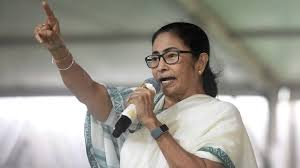Faced with BJP attacks, how TMC has mobilised to defend Bengali migrant workers

Over the past few weeks, tensions have escalated as BJP-ruled states cracked down on Bengali-speaking migrant workers. In response, the Trinamool Congress (TMC), led by Mamata Banerjee, launched a campaign to defend them. The party claims these incidents reflect a pattern of harassment and discrimination.
Now, TMC is fighting back through rallies, legal action, and political messaging. Their aim is to protect migrant workers and energize Bengali pride across the country.
Detentions Spark Public Outcry
The controversy began in Odisha. Local police detained hundreds of Bengali-speaking migrants in Jharsuguda, claiming they were illegal immigrants. Many had valid voter IDs and Aadhaar cards, but that didn’t prevent the action.
In Delhi’s Jai Hind Colony, authorities cut water and power in a Bengali-majority settlement. Officials accused the residents of power theft. The TMC accused the BJP of targeting Bengalis to score political points.
Adding to the controversy, Assam Chief Minister Himanta Biswa Sarma suggested that many Bengali speakers might be foreigners. His remarks sparked anger and renewed claims of profiling.
Mamata Banerjee’s Swift Response
TMC wasted no time. Mamata Banerjee announced a large protest rally in Kolkata, set for July 16, starting from College Square. She invited people across Bengal to join and raise their voices.
Similar rallies will take place in Delhi and other West Bengal districts. The party aims to make it clear: they won’t tolerate humiliation of Bengalis, whether at home or outside.
Legal and Parliamentary Action
TMC didn’t stop at protests. Its leaders filed public interest litigations in the Calcutta High Court. They demanded the release of detained workers and the restoration of basic services in Delhi.
Members of Parliament like Yusuf Pathan and Samirul Islam also wrote to Union Home Minister Amit Shah. They asked for a central investigation and safety measures for migrant workers.
According to them, the BJP is trying to spread fear among Bengali workers. TMC insists these people are Indian citizens who deserve respect and protection.
BJP Denies Targeting Bengalis
The BJP claims the actions were lawful. They say Odisha acted on intelligence reports and that Delhi’s utilities crackdown followed legal procedures. BJP leaders argue that TMC is politicizing routine law enforcement.
Still, many believe the timing and scale of these actions tell a different story. For the TMC, this only strengthens its claim that the BJP holds an anti-Bengali bias.
Bengali Workers: A Political Force
Millions of Bengali-speaking workers live and work across India. They often migrate to Delhi, Gujarat, Maharashtra, and Tamil Nadu for jobs in construction, domestic work, and security.
These workers rarely vote where they work, so they have little political protection. TMC sees them as more than just voters; they are symbols of Bengal’s reach and contribution to the nation.
By supporting them, the party connects emotionally with families back in West Bengal. These families rely on remittances and want their loved ones treated with dignity.
A Message of Cultural Pride
TMC is also reviving its long-standing message of “Bengali pride.” The party has previously celebrated icons like Rabindranath Tagore, Netaji Subhas Chandra Bose, and Kazi Nazrul Islam. Now, it adds a new dimension—defending the rights of Bengalis across India.
This time, the party links cultural pride with constitutional rights. It is no longer just about heritage; it’s also about justice, respect, and national identity.
The Road to 2026
TMC’s actions are not just about today’s problems. With the 2026 Assembly elections in sight, the party is laying the groundwork for a larger campaign. It will likely focus on portraying itself as the true defender of Bengali dignity and civil rights.
Meanwhile, BJP may double down on its law-and-order image and claim it is protecting national security. But the risk for BJP lies in alienating a large and vocal population of Bengali speakers—even in states it currently governs.
Conclusion
TMC has turned recent crackdowns into a statewide campaign. Mamata Banerjee and her team are using legal, political, and emotional tools to rally support. They are fighting not just for migrant workers, but for the broader Bengali identity.
The party’s message is clear: speaking Bengali is not a crime, and working in another state does not strip a person of their rights. With growing public support, the TMC seems ready to carry this message into future political battles—starting now and continuing through 2026.






